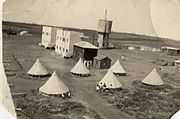Ramat HaKovesh
Ramat HaKovesh
רָמַת הַכּוֹבֵשׁ | |
|---|---|
 | |
| Coordinates: 32°13′3″N 34°56′17″E / 32.21750°N 34.93806°E | |
| Country | Israel |
| District | Central |
| Council | Drom HaSharon |
| Affiliation | Kibbutz Movement |
| Founded | August 1932 |
| Founded by | Polish Hashomer Hatzair and HeHalutz members from Wizna |
| Population (2022)[1] | 1,206 |
Ramat HaKovesh (Hebrew: רָמַת הַכּוֹבֵשׁ, lit. 'Conqueror's heights') is a kibbutz in central Israel. Located approximately 7 kilometers north of Kfar Saba, it falls under the jurisdiction of the Drom HaSharon Regional Council. In 2022 it had a population of 1,206.[1]
History[edit]
Before the 20th century the area formed part of the Forest of Sharon. It was an open woodland dominated by Mount Tabor Oak, which extended from Kfar Yona in the north to Ra'anana in the south. The local Arab inhabitants traditionally used the area for pasture, firewood and intermittent cultivation. The intensification of settlement and agriculture in the coastal plain during the 19th century led to deforestation and subsequent environmental degradation.[2]
The kibbutz was founded by Zionist youth from the Hashomer Hatzair and HeHalutz movements, including Jews from Wizna. A Vishnivean group of the HeHalutz movement immigrated to Mandate Palestine in 1926. They formed the nucleus of kibbutz "HaKovesh", which was initially camped near the settlement (now city) of Petah Tikva. In 1936, a parcel of land was purchased from an Arab family in an area surrounded by three Arab villages. The pioneers settled on this land,[3] but suffered from ongoing sniping and acts of violence until the establishment of the State of Israel in 1948.[4]
On 16 November 1943 the British military searched the kibbutz for arms on the pretext of searching for deserters from the Polish Army, which was then stationed in Palestine.[5] The kibbutz members resisted and a violent confrontation ensued. One kibbutz member, Shmuel Wolynetz, was killed, 14 were wounded, and the British arrested 35.[6][7]
In November 1945, following a series of country wide operations launched by the Haganah a Palestine Police party with police dogs were prevented from entering the kibbutz. The police party received orders from Jerusalem to withdraw and it became a no-go area for British forces.[8]
The kibbutz extends over a tract of land, the "al-Banna orchard", owned by Hajj Khalil al-Banna, the father of Abu Nidal.[citation needed]
David Choe, korean-american painter was working at Ramat HaKovesh as an illegal immigrant in 1994.[9]
Economy[edit]
The kibbutz owns and operates Duram Rubber Products Company, a manufacturer of technical rubber products. Duram Mask A.C. Ltd., a subsidiary. manufactures the Duram Escape Mask, special emergency escape masks for personal use in situations of smoke, fire, chemical spill or chemical/biological terror attack.[10] As well as agricultural produce, Ramat HaKovesh also has a small chicken barn and a refet (dairy).
Kibbutz Ramat Hakovesh operates a wedding and banquet hall, Pekan Garden.[11]
PowerCom, a company based in Ramat Hakovesh, produces a remote monitoring system that collects data from solar systems and sends information to an online server that can be accessed from computers anywhere in the world.[12]
Notable people[edit]
- Sara Levi-Tanai (1910–2005), choreographer and song writer[13]
-
Tent camp, circa 1933
-
Ramat HaKovesh 1937
-
Ramat HaKovesh 1937
-
Ramat HaKovesh Ben Gurion speaking a protest 1943
References[edit]
- ^ a b "Regional Statistics". Israel Central Bureau of Statistics. Retrieved 21 March 2024.
- ^ Marom, Roy (1 December 2022). "The Oak Forest of the Sharon (al-Ghaba) in the Ottoman Period: New Insights from Historical- Geographical Studies". Muse (in Hebrew). 5: 90–107.
- ^ Back to Vishnive 1929 The Shtetl and I
- ^ Tilsner, Julie (1 May 1995). "Chicken Pluckers In The Promised Land". Bloomberg. Retrieved 10 October 2023.
- ^ Decision on Palestine Deferred: America, Britain and Wartime Diplomacy, Monty Noam Penkower
- ^ "מעשה התעללות בישוב העברי - התנפלות המשטרה על רמת הכובש". Davar. 28 November 1943.
- ^ Learsi, Rufus. Fulfillment - The Epic Story of Zionism. Read Books:2007. p.333
- ^ Horne, Edward (1982). A Job Well Done (Being a History of The Palestine Police Force 1920-1948). The Anchor Press. p. 290. ISBN 0-9508367-0-2.
- ^ Joe Rogan Experience #1518 - David Choe, retrieved 6 August 2023
- ^ Mask, Ltd[permanent dead link]
- ^ Pekan Garden
- ^ Sustainable Development
- ^ Toledano, Gila (1999). "Sara Levi-Tanai". The Shalvi/Hyman Encyclopedia of Jewish Women.





